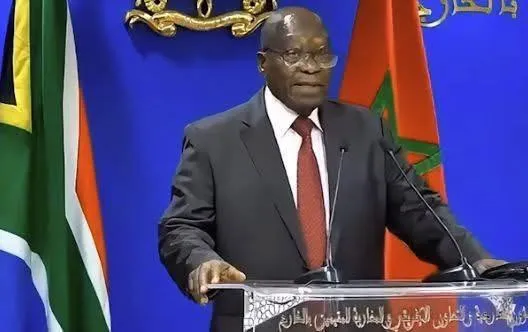
Zuma met with Moroccan Foreign Minister Nasser Bourita in Rabat on July 15, 2025.
Image: Supplied / Facebook
The Department of International Relations and Cooperation Minister Romald Lamola has expressed concern to the Kingdom of Morocco over what he described as an “abuse of the national symbol” following a visit by former president and Umkhonto weSizwe (MK) Party leader Jacob Zuma.
Zuma met with Moroccan Foreign Minister Nasser Bourita in Rabat on July 15, 2025.
“While we recognize and respect Morocco’s sovereign right to invite individuals and groups, DIRCO, on behalf of the Government of the Republic of South Africa, strongly protests the use of South African national symbols - in this instance, the South African national flag, during the meeting between Mr Jacob Zuma and the foreign minister of the Kingdom of Morocco,” said Lamola.
Zuma, who was accompanied by the MK Party’s Head of Presidency, Magasela Mzobe, was photographed alongside Moroccan officials with both South African and Moroccan flags displayed prominently.
DIRCO spokesperson Chrispin Phiri said the department viewed this as a breach of diplomatic norms.
“The use of the South African national flag in a meeting with a member of a political party in opposition, which is a non-state actor, constitutes an abuse of existing protocol and decorum and undermines official bilateral relations between the Republic of South Africa and the Kingdom of Morocco.”
He added that national symbols such as the flag inherently convey official state endorsement, and their use in such contexts “elevates the perception of the encounter to that of a state-to-state engagement”.
“This characterisation is inconsistent with established diplomatic protocol, as the participants did not represent the official positions or engagements of the South African state.”
Phiri stated that South Africa had made it clear to Morocco that such portrayals could not be recognised as official bilateral engagements and that any implications drawn from the meeting were “firmly rejected”.
“The government of the Republic of South Africa holds the firm view that the use of its national symbols in contexts implying official state endorsement of non-governmental engagements is inappropriate, irrespective of the setting,” he said.
“In the spirit of fostering and maintaining cordial and friendly bilateral relations, and consistent with the fundamental principles of mutual respect between sovereign states and non-interference in internal affairs, South Africa respectfully encourages the Government of the Kingdom of Morocco to refrain from such actions.”
He said adherence to these shared principles was essential for the continued development of positive relations between the two countries.
Zuma’s visit sparked widespread condemnation from political parties, including the ANC.
IOL News previously reported that ANC secretary-general Fikile Mbalula labelled Zuma a “sellout” for supporting Morocco.
The Western Sahara, a sparsely populated desert region on Africa’s northwest coast, was formerly a Spanish colony. Morocco annexed the territory in 1975, resulting in a decades-long territorial dispute with the indigenous Sahrawi people, represented by the Polisario Front.
“We, as the ANC, will fight side by side for the self-determination of the Sahrawi people. We are in solidarity with them, and Morocco must stop the occupation of Western Sahara,” said Mbalula.
“Zuma is no messiah. He is a sellout of note. Whatever his reasons, we are not surprised. The decision to steal the assets of the ANC to form a political party, and call it what it is, to divide our people, to weaken the African National Congress for his own personal aggrandisement, is what he has been. History will remember him for that.”
Former MK Party secretary-general Floyd Shivambu also criticised Zuma’s recognition of Moroccan sovereignty, calling it “opportunistic” and a departure from the anti-colonial principles of liberation movements.
“This move contradicts our history of supporting oppressed peoples,” Shivambu said in a social media post.
Dr David Nyekorach-Matsanga, chair of the Pan African Forum Ltd & Associates, issued a statement condemning Zuma’s stance, calling it a “betrayal of African solidarity” and a violation of African Union (AU) principles.
“Endorsing this occupation equates to endorsing colonialism,” the statement read.
“It dishonours the legacy of the late Muammar Gaddafi, a key defender of the Sahrawi cause. Western Sahara is a recognised member of the AU, and its right to self-determination is protected under Article 20 of the African Charter on Human and Peoples’ Rights.”
In response to criticism, the MK Party previously released a policy position reaffirming its commitment to improved relations between South Africa and Morocco, rooted in mutual sovereignty and African unity.
“The MK Party’s identity is deeply rooted in the historic struggle for liberation and dignity in South Africa. Similarly, Morocco’s history is marked by its resistance to colonial domination and its determined pursuit of national unity.”
“Morocco was the first country to lend financial and military support to Umkhonto weSizwe in 1962. Morocco’s efforts to reclaim its full territorial integrity align with the MK Party’s commitment to preserving the sovereignty and unity of African states,” the policy said.
simon.majadibodu@iol.co.za
IOL Politics